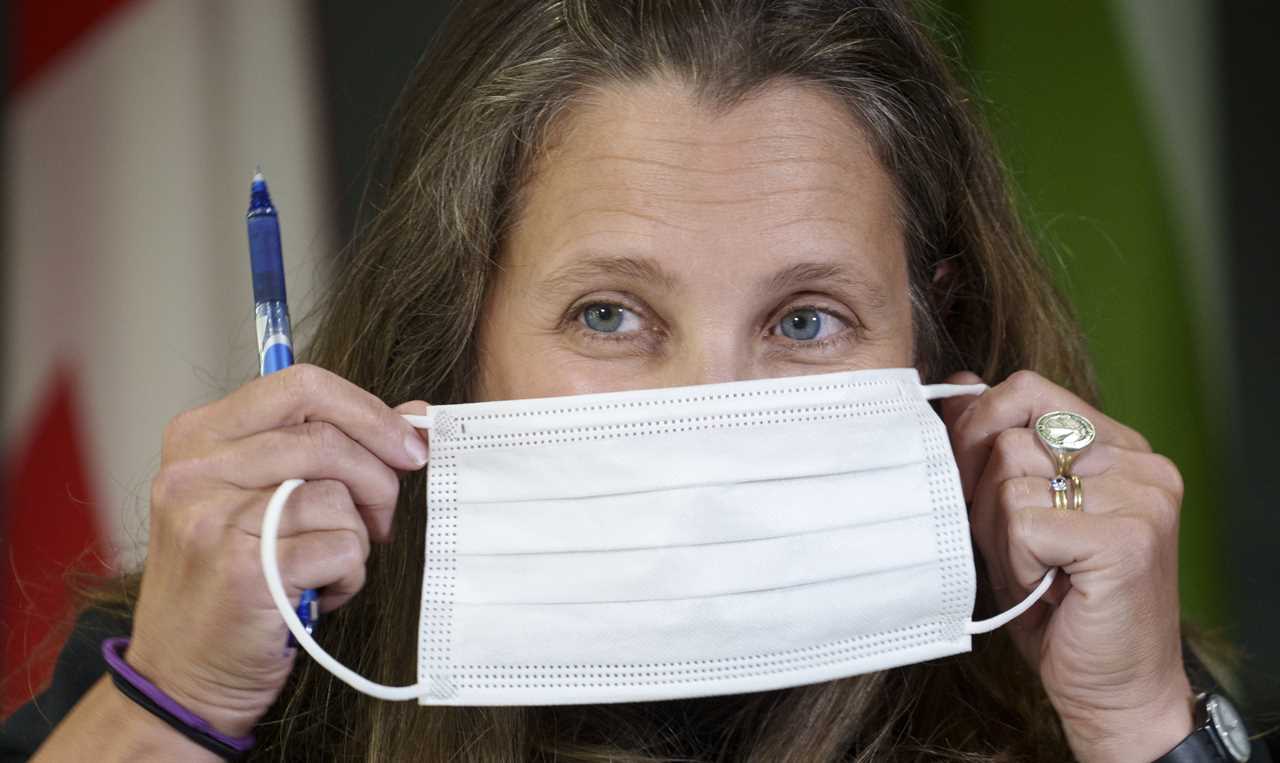
Welcome to a sneak peek of the Maclean’s Politics Insider newsletter. Sign up to get it delivered straight to your inbox in the morning.
Health care dominated the start of the second week of the federal election campaign, the Globe reports, with the Liberals repeating a promise to hire more family doctors and the Conservatives calling for an investigation into a Liberal video that Twitter deemed manipulated.
Justin Trudeau was in Halifax on Monday to announce $6-billion toward cutting wait lists, as well as $3-billion to hire doctors, nurses and nurse practitioners. As Trudeau made the campaign promise, the Conservatives sent a letter to the Commissioner of Canada Elections complaining about a video Chrystia Freeland posted to Twitter Sunday using edited clips from a talk Mr. O’Toole gave last July.
Twitter later labelled the French and English versions of the video “manipulated media.” According to its policy, entities may not “deceptively promote synthetic or manipulated media that are likely to cause harm.” The social media site says it may label tweets containing synthetic or manipulated media “to help people understand their authenticity and to provide additional context.”
“The Tweets in question have both been labelled in line with our global synthetic and manipulated policy,” Twitter Canada said in a statement to The Globe and Mail.
Your correspondent was at Trudeau’s Halifax news conference and has a column about it. John Ivison of the National Post was also there and also has a column on it.
Game theory: In Maclean’s, Paul Wells wonders what will happen if the Conservatives win more seats than the Liberals.
Probably, Justin Trudeau resigns and Erin O’Toole becomes prime minister. As I’ve said, there’s no rule that seat plurality = power, but that expectation is easy to understand and hard to fight. But what if the results really are close, and Justin Trudeau is feeling scrappy? In that scenario, until the Commons tells him otherwise, he’s still the prime minister. He convenes Parliament, has Mary Simon deliver a Throne Speech, and then MPs vote. Suddenly the other parties have a decision to make.
In the Globe, Campbell Clark writes that Trudeau “still hasn’t framed the election. He hasn’t provided a focused answer to the basic question raised by calling an election: What is this all about?”
In the Montreal Gazette, L Ian Macdonald observes that “events may be conspiring against Justin Trudeau.”
And in Maclean’s, Andrew MacDougall observes that the Liberals are “going low.”
It turns out misdirected or misfiring Liberal attacks are quickly becoming a thing in this unnecessary election. First it was Trudeau’s vaccine position for the public service which was, in fact, further from the public service’s than O’Toole’s, which was largely congruent with the public sector unions’ demands. And now there’s this case of Doctored Zhivago. They’re the kinds of mistakes winning campaigns don’t make.
Susan Delacourt, in the Star, eloquently puts Freeland’s misstep in historical context, and suggests she should have said no when “the Liberal backroom team asks her to put her name and reputation on the line for the sake of a low-level attack ad.”
Tightening: The Liberals and Conservatives are now tied as O’Toole gains momentum, according to rolling polls from EKOS, Nanos and Mainstreet.
An interesting poll from Ipsos finds a “volatile electorate who could be easily swayed one way or the other.”
Three in ten (31%) Canadians say they don’t know who is going to win the upcoming federal election, meaning that millions of Canadians believe the election will mean something and will help to determine who leads the next government. An Ipsos poll released earlier this week showed that 13% of Canadians remain completely undecided. Among those who do indicate a choice, only 45% are absolutely certain of that choice, reserving the right to switch their vote. Layer on this the unpredictability of turnout in a pandemic election, strategic voting and other motivations, and this election has the potential to present a few surprises to Canadians and pollsters alike.
Green promises: Jagmeet Singh went to Outremont Monday to promise to eliminate subsidies for oil and gas companies, replacing them with direct funding for renewable energy projects, the Canadian Press reports. “What we’d like to do is invest directly into remediation of oil wells,” Singh said. “We’d like to invest directly in retrofitting some of these oil wells into geothermal plants.”
Fisman out: Epidemiologist Dr. David Fisman has resigned from the Ontario’s COVID-19 Science Advisory Table, complaining the group has delayed publication of its pandemic projections for the fall, CBC reports. “I find myself increasingly uncomfortable with the degree to which political considerations appear to be driving outputs from the tables, or at least the degree to which these outputs are shared in a transparent manner with the public,” he wrote.
The post A Twitter video gone wrong and the unpredictability of a pandemic election appeared first on Macleans.ca.
-------------------------------
By: Stephen Maher
Title: A Twitter video gone wrong and the unpredictability of a pandemic election
Sourced From: www.macleans.ca/politics/a-twitter-video-gone-wrong-and-the-unpredictability-of-a-pandemic-election/
Published Date: Tue, 24 Aug 2021 16:03:06 +0000
Read More
 UK PoliticsWorld PoliticsVideosPrivacy PolicyTerms And Conditions
UK PoliticsWorld PoliticsVideosPrivacy PolicyTerms And Conditions
